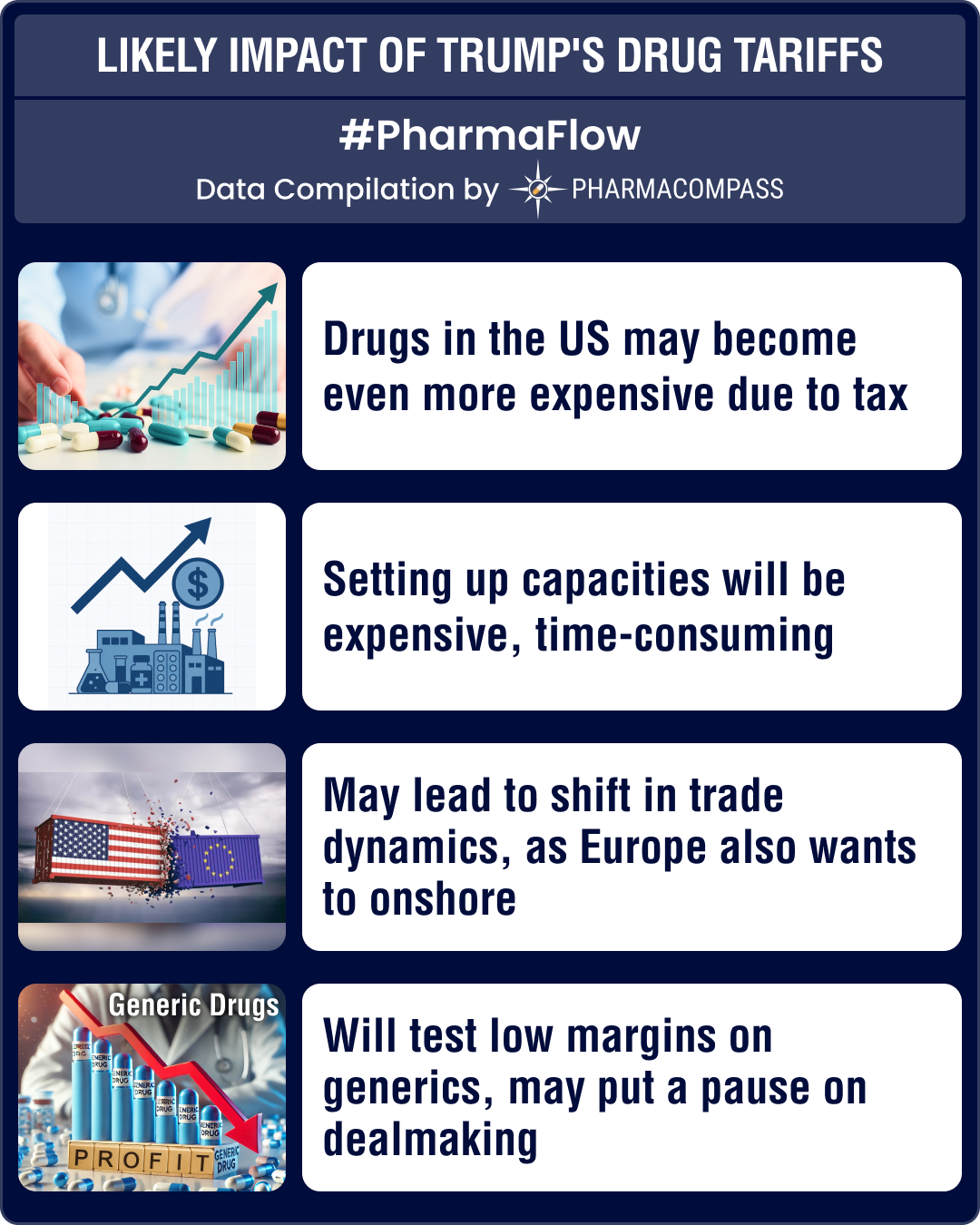
This week, Phispers brings you news on J&J’s plans to acquire Actelion and Teva’s new medical cannabis inhaler due for launch in Israel. There are pharma deals from across the globe, such as Roche’s decision to sell its South Carolina plant and Catalent’s acquisition of Accucaps.
M&A Compass: Roche sells API plant; Catalent laps up
Accucaps; Teva
announces layoffs
Swiss drug maker Roche is selling its active pharmaceutical ingredients (API) plant in South Carolina (US) to Patheon NV, a leading global provider of high-quality drug development and delivery solutions to the pharmaceutical and biopharma sectors. The deal will save 200 jobs in South Carolina. Patheon has also entered into a multi-year supply arrangement with Roche.
Meanwhile, Catalent, Inc has acquired Accucaps Industries Limited, a Canada-based developer and manufacturer of over-the-counter (OTC), high potency and conventional pharmaceutical softgels. The acquisition is subject to approval by the Canadian government. It will substantially complement Catalent’s global OTC and prescription pharmaceutical softgel capabilities and capacity.
While Patheon and Catalent are making acquisitions, Teva announced layoffs, and Pfizer cancelled its expansion plans in Ireland. Two ministers of Malta announced that Teva Pharmaceutical Industries will be laying off over 200 workers before the end of 2017.
Earlier this year, Teva had acquired Actavis Generics and recently informed the government of its decision to start “consolidating production” around its 30 plants in Europe and that it would also lay off workers in Malta.
Meanwhile, Pfizer has cancelled a planned US $ 425 million expansion of its Grange Castle plant in Dublin, a development which would have led to permanent employment for 350 people and 1,250 jobs during construction.
Pfizer is one of Ireland’s largest private sector employers. It had sought permission earlier this year for a major extension to the plant. However, the plans have been shelved due to failure of a high-profile, late-stage pipeline drug to lower cholesterol.
Teva to market medical
cannabis inhaler in Israel
For the first time, the medical cannabis sector managed to comply with the pharmaceutical standards for inhalation. Israel’s Teva Pharmaceuticals has partnered with Tel Aviv-based Syqe Medical to market medical cannabis in Israel for pain management. The dose is administered with the help of an inhaler — the most efficient means of administering cannabis.
Teva will be the exclusive marketer and distributor of the inhaler in Israel. The inhaler, which is pending approval from Israel’s ministry of health, will be available for home use.
J&J approaches Actelion for acquisition; Actelion says no
guarantee of the deal
Last week, Switzerland’s leading biopharmaceutical company — Actelion Ltd — confirmed that it has been approached by the US healthcare titan Johnson & Johnson for a possible takeover. Actelion is focused on the discovery, development and commercialization of innovative drugs, and is a leader in the field of pulmonary arterial hypertension (PAH).
However, Actelion said there is no guarantee of the deal. Actelion chief executive Jean-Paul Clozel desires to keep the company independent after building it from scratch. And news reports say J&J will have to pay a steep premium if a takeover is to succeed.
Actelion's rare-disease focus makes it an attractive target, since its drugs face less price pressure than other more widely used medicines. There are other reasons why the takeover looks improbable. First, Actelion’s market capitalization far outstrips its net present value. Second, President-elect Donald Trump’s proposed repatriation holiday may come in the way of J&J making the acquisition.
Drugs in India fail quality standards; Vietnam bans major
Indian manufacturers
This was a bad week for Indian pharma. Drug regulators of seven Indian states alleged that 27 medicines — sold by 18 major drug companies — are of “substandard” quality. These were cited with false labelling, wrong quantity of ingredients, discoloration, moisture formation, failing dissolution test and failing disintegration test.
The tests on the 27 medicines were done by drug regulators of Maharashtra, Karnataka, West Bengal, Goa, Gujarat, Kerala and Andhra Pradesh. The drug makers include Abbott India, GSK India, Sun Pharma, Cipla and Glenmark Pharma, Alkem Labs, Cadila Healthcare, Emcure Pharma, Hetero Labs, Morepen Labs, Macleods Pharma, Wockhardt Pharma and Zydus Healthcare.
The drug brands alleged to be substandard are: antipsychotic drug Stemetil and antibiotic drug Pentids from Abbott India, anti-bacterial medicine Althrocin by Alembic Pharma, migraine medication Vasograin by Cadila Pharma, cough syrup Ascoril by Glenmark Pharma, worm infection drug Zentel by GSK India, arthritis medication Hydroxychloroquine (HCQS) by Ipca Labs, anti-inflammatory medication Myoril by Sanofi Synthelabo, and Torrent Pharma’s hypertension drug Dilzem.
In Parliament, the minister of state for health said that drugs, which are banned in other countries, have been allowed to be sold in India subject to certain provisions. The drugs which have been allowed in India are nimesulide, analgin and pioglitazone.
What was worse, Vietnam blacklisted 39 Indian drug companies, including Aurobindo Pharma, Cadila and Macleods Pharmaceuticals for quality standard violations. The Vietnamese drug regulator has also banned companies in Bangladesh and South Korea. The regulator has listed the names of blacklisted companies on its website.
FDA’s quality metrics programme to be voluntary till 2018
Last week, the US Food and Drug Administration (FDA) released a revised version of its proposal to collect quality metrics data from drug manufacturers in response to protests from the industry.
As per the revised draft, the program will begin with a voluntary phase that will run into 2018, after which the FDA intends to make the program mandatory.
The revised draft guidance also narrows the scope of the program by cutting the number of metrics the agency plans to ask for. It also grants more flexibility with quality metrics to drug companies that are reporting by both product and site.
"The revised draft guidance includes the following changes from the earlier draft guidance: Adoption of a phased-in (voluntary) approach, reduction in the number of data elements requested (i.e., reduction in reporting burden), support for both product reports and site reports, modifications to the quality metrics data definitions, addition of clarifying examples for the definitions, addition of comment fields, and clarification of special considerations for non-application and OTC (over-the-counter) product reporting," the FDA said.
EMA publishes results of two more clinical studies
The European Medicines Agency (EMA) has published clinical data for two more medicines — Armisarte and Caspofungin — on its clinical data website. The clinical data website was launched on October 20, 2016, when the EMA had added clinical data for Kyprolis and Zurampic.
The website is in line with the EMA’s policy on the publication of clinical data.
Armisarte, a hybrid product (a product that is similar to its reference product but is available in a different pharmaceutical form), is indicated for the treatment of malignant pleural mesothelioma lung cancer and advanced non-small-cell lung cancer.
Caspofungin Accord, a generic product, is indicated for the treatment of invasive candidiasis, invasive aspergillosis and other fungal infections when the patient is febrile and neutropenic.
Pharmaceuticals most counterfeited category, says report
A new report cites pharmaceuticals as the most targeted category for counterfeiting. Globalization and the booming use of the internet is giving a boost to counterfeiting.
The report has been launched by online brand protection firm, NetNames. Titled The Risks of the Online Counterfeit Community, the report looks at online counterfeiting. It warns that no brand can afford to underestimate the sophistication of fraudsters in the digital world.
The size of the counterfeit market for pharmaceuticals is estimated at US $ 200 billion, followed by electronics (US $ 169 billion) and food (US $ 49 billion). According to NetNames, one in six products bought online is fake. And one-third of all counterfeit seizures in the EU are linked to internet distribution channels.
According to NetNames, there are up to 50,000 internet pharmacies in operation. Around 95 per cent of these do not comply with laws and industry standards. Meanwhile, 90 per cent of drugs purchased online come from a different country than what the website claims.
According to the report, the internet provides counterfeiters with anonymity, virtually no barriers to entry, low overheads, easier distribution with more frequent, smaller consignments sent by mail, and fewer risks of being caught. And the desire by consumers to seek out big brands online at discount prices, is providing counterfeiters with a ready target audience and the opportunity to further the fraudsters' reach and potential profitability.
Trump announces Tom Price as health secretary
This week, America’s President-elect Donald Trump announced Republican US Representative Tom Price as his Health and Human Services Secretary. Price is an orthopedic surgeon from Georgia.
Seema Verma, the founder of a health policy consulting company, will lead the Centres for Medicare and Medicaid Services, which is part of Health and Human Services (HHS).
Meanwhile, Trump is expected to name Steven Mnuchin, a former Goldman Sachs partner and Hollywood financier, as his nominee for the post of Treasury Secretary. Mnuchin, who spent 17 years at Goldman Sachs before leaving in 2002 to launch a hedge fund, served as Trump's campaign finance chairman. Billionaire investor Wilbur Ross, known for his investments in distressed industries, is expected to be named Commerce Secretary.
The PharmaCompass Newsletter – Sign Up, Stay Ahead
Feedback, help us to improve. Click here
Image Credit : marijuana by keep_bitcoin_real is licensed under CC BY 2.0
“ The article is based on the information available in public and which the author believes to be true. The author is not disseminating any information, which the author believes or knows, is confidential or in conflict with the privacy of any person. The views expressed or information supplied through this article is mere opinion and observation of the author. The author does not intend to defame, insult or, cause loss or damage to anyone, in any manner, through this article.”






